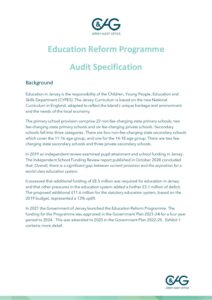
Monday 7 April 2025 - Audit Specification
Monday 7 April 2025 - Audit Specification
Topics: Value for Money
Departments: Children, Young People, Education and Skills
Sector: Education

Audit Specification: pdf (187.26 KB)
Download in full ↓Education in Jersey is the responsibility of the Children, Young People, Education and Skills Department (CYPES). The Jersey Curriculum is based on the new National Curriculum in England, adapted to reflect the Island’s unique heritage and environment and the needs of the local economy.
The primary school provision comprise 22 non-fee-charging state primary schools, two fee-charging state primary schools and six fee-charging private schools. Secondary schools fall into three categories. There are four non-fee-charging state secondary schools which cover the 11-16 age group, and one for the 14-18 age group. There are two fee-charging state secondary schools and three private secondary schools.
In 2019 an independent review examined pupil attainment and school funding in Jersey. The Independent School Funding Review report published in October 2020 concluded that: Overall, there is a significant gap between current provision and the aspiration for a world class education system.
It assessed that additional funding of £8.5 million was required for education in Jersey and that other pressures in the education system added a further £3.1 million of deficit. The proposed additional £11.6 million for the statutory education system, based on the 2019 budget, represented a 13% uplift.
In 2021 the Government of Jersey launched the Education Reform Programme. The funding for the Programme was approved in the Government Plan 2021-24 for a four year period to 2024. This was extended to 2025 in the Government Plan 2022-25.
At the end of 2023 the Education Reform Programme was reported to be in closure with any remaining works forming part of business as usual for 2024. The additional funding associated with the Programme is also now part of ‘business as usual’ funding as part of the core departmental budget.
When the Education Reform Programme was launched it was intended to deliver
The Education Reform Programme contained over 25 projects broadly clustered into three areas:
In December 2021 the UK’s National Association for Educational Needs (nasen) published its review of Jersey’s practices and policies concerning inclusion. This identified that the prevailing approach to education in Jersey was based on separating provision and that there was an opportunity to move to a continuum of inclusion.
In 2022 the 50 recommendations from the nasen review were integrated into the Education Reform Programme. In addition, the Government Plan 2023-26 approved additional funding specifically targeted at inclusion of £6.1 million per annum from 2023.
This audit will evaluate whether the Government has taken and is taking an approach to reforming education that:
It will consider the progress and impact of the Education Reform Programme, including the principles of inclusion, as delivered by CYPES and within a sample of statutory education providers.
It will not consider post-18 education.

Associate Member of EURORAI - a cooperation project between public sector supervisory bodies in Europe